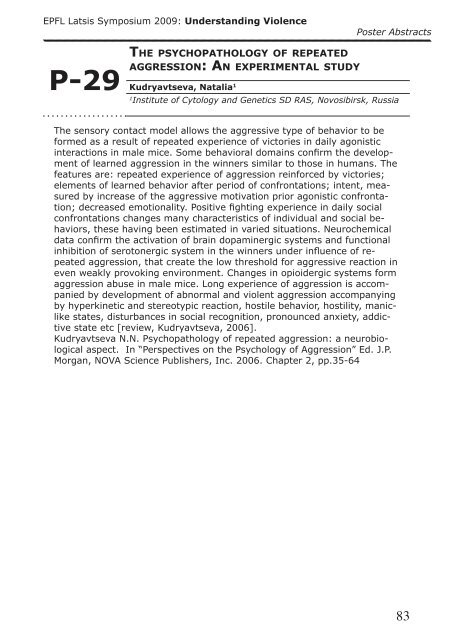Program & Abstract Book - EPFL Latsis Symposium 2009
Program & Abstract Book - EPFL Latsis Symposium 2009
Program & Abstract Book - EPFL Latsis Symposium 2009
Create successful ePaper yourself
Turn your PDF publications into a flip-book with our unique Google optimized e-Paper software.
<strong>EPFL</strong> <strong>Latsis</strong> <strong>Symposium</strong> <strong>2009</strong>: Understanding Violence<br />
P-29<br />
th e p s y c h o p a t h o l o g y o f r e p e a t e D<br />
a g g r e s s i o n: an e X p e r i m e n t a l s t u D y<br />
Kudryavtseva, Natalia 1<br />
Poster <strong>Abstract</strong>s<br />
1 Institute of Cytology and Genetics SD RAS, Novosibirsk, Russia<br />
The sensory contact model allows the aggressive type of behavior to be<br />
formed as a result of repeated experience of victories in daily agonistic<br />
interactions in male mice. Some behavioral domains confirm the development<br />
of learned aggression in the winners similar to those in humans. The<br />
features are: repeated experience of aggression reinforced by victories;<br />
elements of learned behavior after period of confrontations; intent, measured<br />
by increase of the aggressive motivation prior agonistic confrontation;<br />
decreased emotionality. Positive fighting experience in daily social<br />
confrontations changes many characteristics of individual and social behaviors,<br />
these having been estimated in varied situations. Neurochemical<br />
data confirm the activation of brain dopaminergic systems and functional<br />
inhibition of serotonergic system in the winners under influence of repeated<br />
aggression, that create the low threshold for aggressive reaction in<br />
even weakly provoking environment. Changes in opioidergic systems form<br />
aggression abuse in male mice. Long experience of aggression is accompanied<br />
by development of abnormal and violent aggression accompanying<br />
by hyperkinetic and stereotypic reaction, hostile behavior, hostility, maniclike<br />
states, disturbances in social recognition, pronounced anxiety, addictive<br />
state etc [review, Kudryavtseva, 2006].<br />
Kudryavtseva N.N. Psychopathology of repeated aggression: a neurobiological<br />
aspect. In “Perspectives on the Psychology of Aggression” Ed. J.P.<br />
Morgan, NOVA Science Publishers, Inc. 2006. Chapter 2, pp.35-64<br />
83


